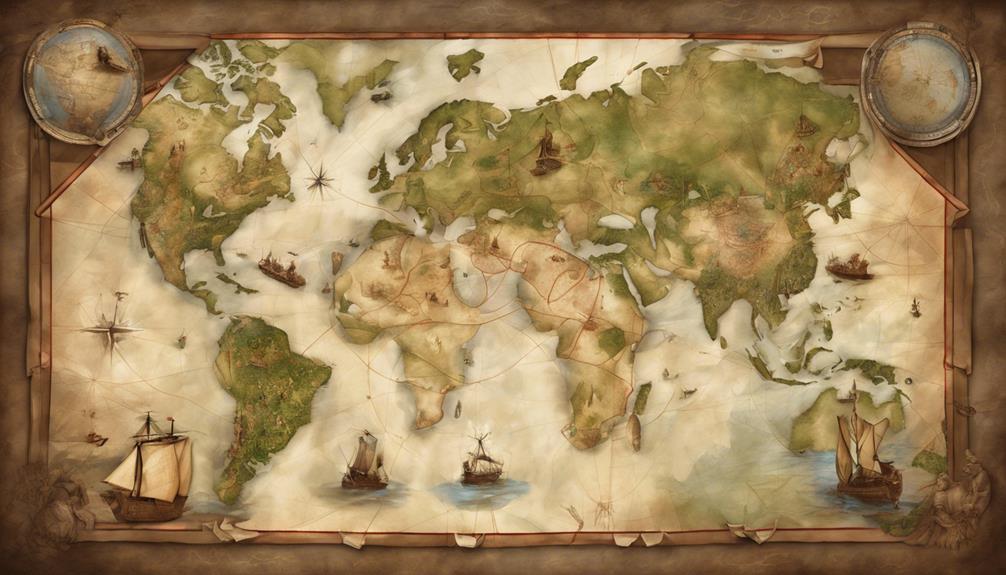Throughout history, explorers have made significant discoveries that have reshaped our understanding of the world. From uncovering new lands to mapping uncharted territories, their expeditions have left an indelible mark on human history. The question remains: what were the greatest discoveries made by these intrepid adventurers? Join us as we delve into the achievements of explorers that have shaped the course of civilizations and expanded the boundaries of human knowledge.
Key Takeaways
- Exploration impacted global trade, cultural exchanges, and geography.
- Conquests reshaped civilizations and established dominance.
- Encounters fostered cultural understanding and knowledge exchange.
- Botanical discoveries enriched European knowledge and scientific contributions.
Marco Polo's Silk Road Journey
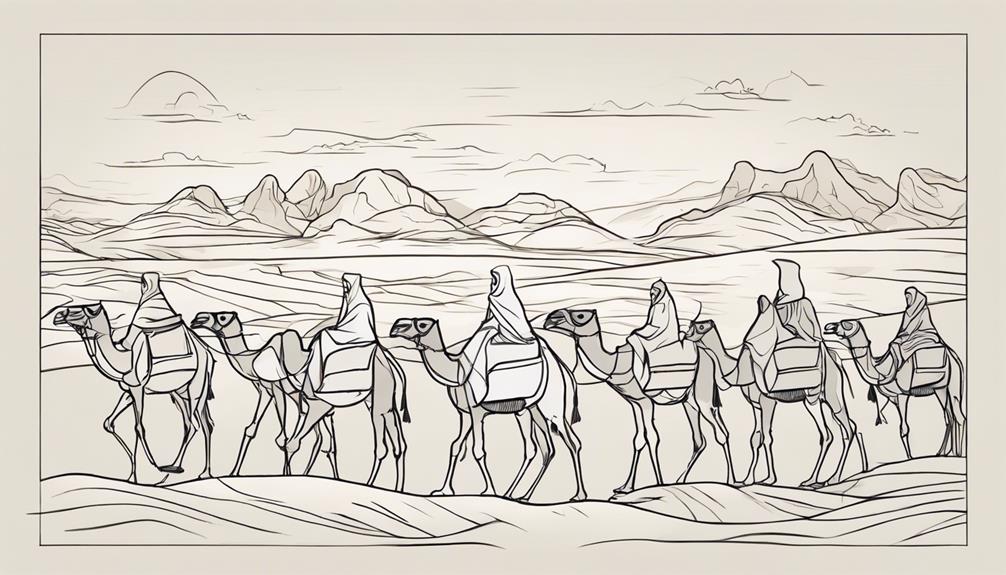
Marco Polo's extensive travels along the Silk Road during the years 1271 to 1295 significantly influenced the exchange of goods, ideas, and cultures between Europe and Asia. His journey was not only a personal adventure but a pivotal moment in history that opened up new avenues for trade and cultural interactions. Serving as a governor in a Chinese city and being appointed as an official of the Privy Council by Kublai Khan, Marco Polo's experiences provided valuable insights into the East, which he meticulously documented in 'The Travels of Marco Polo'.
Christopher Columbus' New World
The exploration of Christopher Columbus in 1492, leading to the discovery of the New World, marked a significant turning point in global history, reshaping trade routes and intercontinental interactions. Columbus's voyage, seeking a western route to Asia, inadvertently unveiled the existence of the Americas. This event triggered a wave of European exploration and colonization, fundamentally altering the course of history during the Age of Exploration. The encounter between Columbus and the Indigenous peoples of the Americas initiated lasting cultural exchanges, although Columbus mistakenly referred to them as 'Indians,' believing he had reached Asia. The discovery of the New World had profound implications, transforming global trade, geopolitics, and societal structures. Despite controversies surrounding Columbus's legacy, his expedition remains a pivotal moment in world history, fueling further exploration and shaping the modern world. The impact of Columbus's journey extends far beyond his initial aspirations, leaving an indelible mark on the interconnectedness of civilizations and the course of human events.
Amerigo Vespucci's Continent Naming
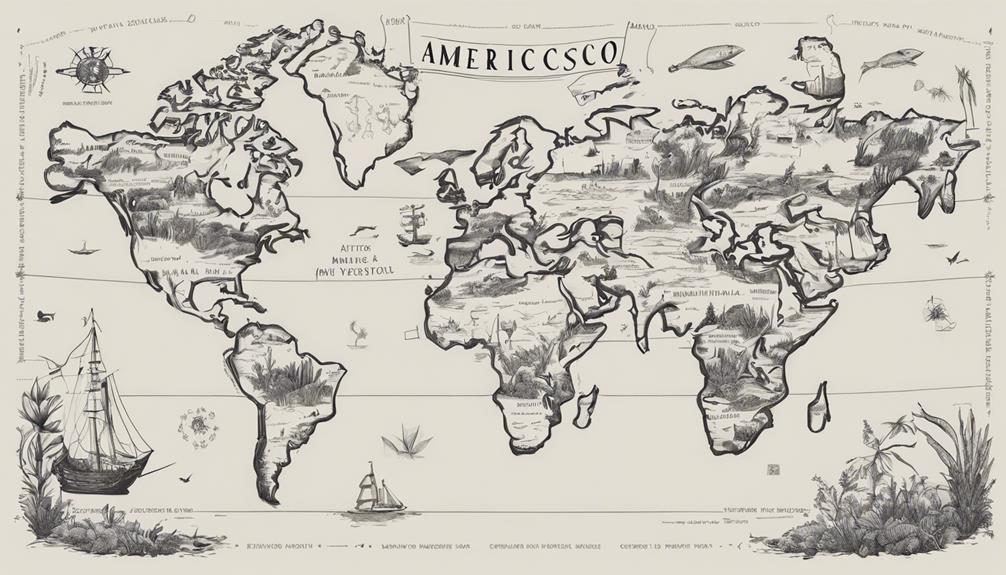
Remarkably, the recognition of South America as a distinct continent by Amerigo Vespucci during his explorations significantly impacted the world's cartography and understanding of geographical boundaries. Vespucci's voyages played a crucial role in differentiating South America from Asia, correcting the misconception that Brazil was part of the Asian continent. This distinction reshaped world maps and expanded the knowledge of the New World's geography.
- Vespucci's realization that South America was a separate landmass challenged existing beliefs about the world's structure.
- Martin Waldseemüller's decision to name the newfound lands "America" after Amerigo Vespucci in 1507 immortalized his contributions to geographical knowledge.
- The continent naming not only honored Vespucci but also acknowledged the significance of his voyages in uncovering and defining the continents of the Western Hemisphere.
Ferdinand Magellan's Circumnavigation Achievement
A pivotal moment in the history of exploration, Ferdinand Magellan's successful circumnavigation of the Earth in the early 16th century stands as a testament to human ingenuity and determination in unraveling the mysteries of the world's geography. Magellan's expedition, starting with 270 men, embarked on a journey that would prove the Earth's spherical nature by completing a full trip around the globe, even after Magellan's death in the Philippines in 1521. With less than 150 survivors facing numerous challenges, including harsh conditions and conflicts, the achievement of circumnavigating the globe marked a significant milestone in the age of global exploration. Magellan's accomplishment not only showcased the capabilities of early European explorers but also paved the way for new opportunities in trade routes and further expeditions, demonstrating the potential for further discoveries and advancements in understanding the world. Ferdinand Magellan's legacy in global exploration remains a cornerstone in the history of human endeavors to uncover the secrets of the Earth's geography.
Hernán Cortés' Conquest of the Aztecs
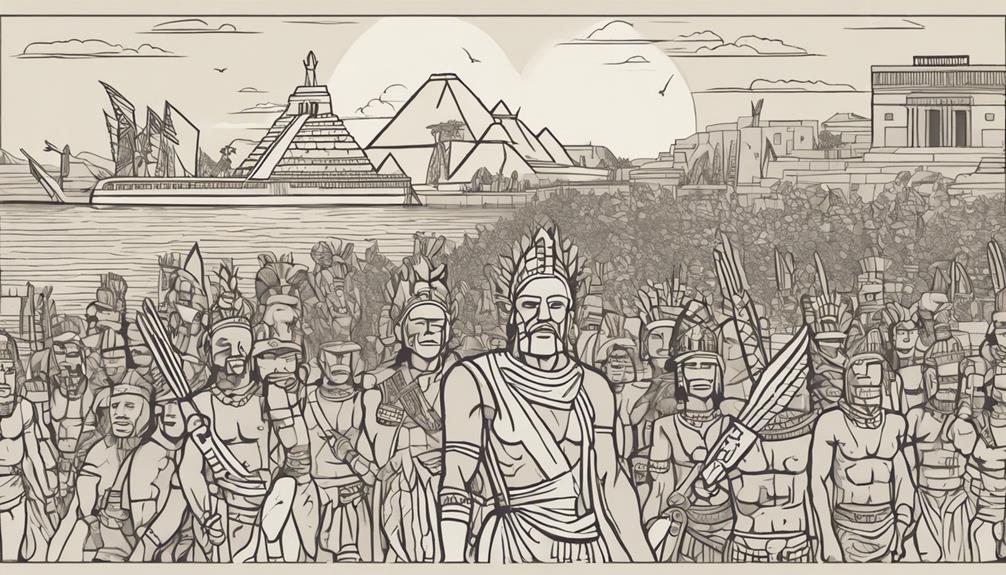
Hernán Cortés' military campaign against the Aztec Empire in 1521 marked a pivotal moment in the history of Spanish conquest in the Americas. This Spanish conquistador orchestrated a series of strategic moves that led to the fall of the Aztec civilization and the subsequent claiming of Mexico for Spain. The conquest was not without bloodshed, as battles between Cortés' forces and Indigenous peoples, including the Tlaxacan and Cholula warriors, resulted in a devastating estimated death toll of up to 100,000 individuals.
Cortés' overthrow of the Aztec ruler, Montezuma, and his subsequent appointment as the governor of New Spain by the Spanish crown in 1522 solidified Spain's control over the region and marked a significant chapter in the Spanish colonization of the Americas. The impact of Cortés' conquest reverberated throughout the Americas, shaping the course of history for both the Indigenous peoples and European colonizers.
Sir Francis Drake's Global Exploration
Sir Francis Drake's pioneering global expedition, which commenced in 1577 and concluded in 1580, marked a significant milestone in the annals of English maritime exploration. Drake, the first Englishman to circumnavigate the globe, was knighted by Queen Elizabeth I for his accomplishments. His successful voyage included not only circumnavigation but also daring raids on Spanish settlements and ships, establishing him as a skilled privateer. These actions were instrumental in the defeat of the Spanish Armada in 1588, bolstering England's naval dominance. Despite his celebrated achievements, Drake's life was cut short in 1596 due to dysentery following an unsuccessful raiding mission.
| Facts about Sir Francis Drake |
|---|
| First Englishman to circumnavigate the globe |
| Knighted by Queen Elizabeth I |
| Played a key role in defeating the Spanish Armada |
Sir Francis Drake's legacy as a fearless explorer and naval strategist endures, leaving an indelible mark on the history of English exploration and maritime supremacy.
Sir Walter Raleigh's Colonial Ventures
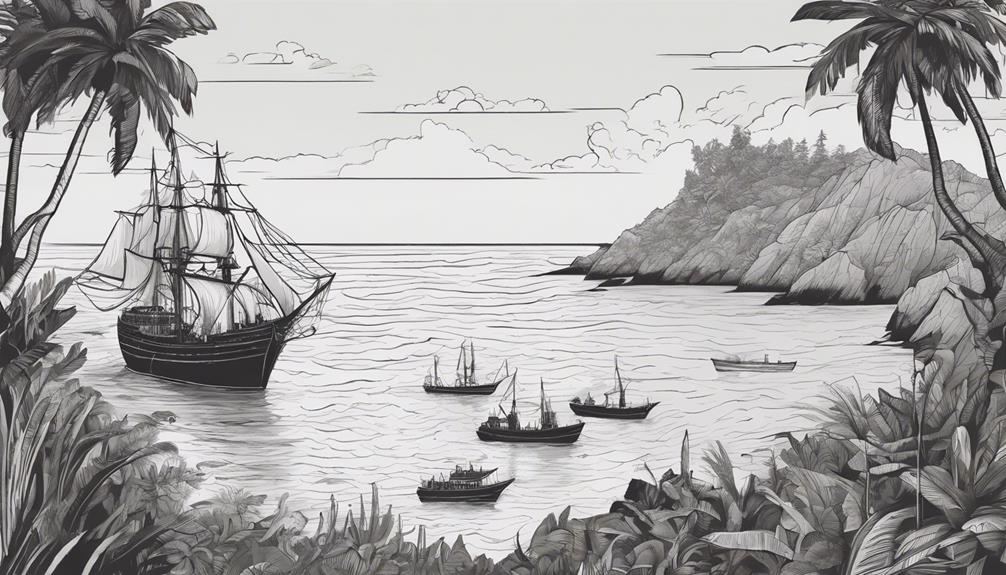
Walter Raleigh's Colonial Ventures during the late 16th century in North America marked a pivotal moment in English exploration and colonization efforts in the New World. His establishment of the Roanoke Colony in present-day North Carolina set the stage for further English presence in the Americas. Raleigh's introduction of tobacco and potatoes to Europe from the Americas revolutionized agricultural practices and diets in Europe, demonstrating the significance of the Columbian Exchange initiated by earlier explorers. His efforts in colonizing the United States not only contributed to English expansion but also paved the way for future settlements and interactions with Indigenous peoples.
- Sir Walter Raleigh's Roanoke Colony provided a foundation for English colonization in North America.
- Raleigh's introduction of new crops like tobacco and potatoes from the Americas to Europe had a lasting impact on agricultural practices and diets.
- His colonial ventures played a crucial role in shaping early English exploration and expansion efforts in the New World.
James Cook's Pacific Voyages
James Cook's Pacific voyages were instrumental in advancing geographical knowledge through his meticulous mapping of New Zealand and Australia. His encounters with indigenous peoples in the Hawaiian Islands and documentation of new plant and animal species provided valuable insights into Pacific ecosystems. Cook's expeditions also debunked the existence of Terra Australis, reshaping scientific understanding of the region's geography.
Cook's Mapping Contributions
Cook's Pacific voyages, renowned for their meticulous mapping efforts, were instrumental in advancing our understanding of the geographical features of New Zealand and Australia's eastern coastline. His detailed charts and navigational skills significantly improved knowledge of Pacific geography, providing crucial information on the Great Barrier Reef's unique ecosystem. Moreover, Cook's mapping expeditions helped dispel the myth of a vast southern continent known as Terra Australis. The accuracy and detail of Cook's maps laid the groundwork for future exploration and colonization in the Pacific region. Cook's contributions not only enhanced geographical knowledge but also paved the way for further scientific exploration and understanding of the Pacific territories.
Indigenous Encounters
Encounters between James Cook's Pacific voyages and the Indigenous peoples of New Zealand and Australia provided invaluable insights into the cultures, languages, and customs of these populations, influencing European perceptions and shaping future exploration endeavors. Cook's interactions with the Maori of New Zealand and the Aboriginal peoples of Australia highlighted the complexities of cross-cultural communication and understanding. The documentation of these encounters from Cook's expeditions served as a crucial source of information for Europeans, contributing to their understanding of the Pacific region. Furthermore, the accounts of Indigenous encounters continue to be scrutinized by historians and anthropologists, shedding light on the impact of European exploration on Indigenous societies. Cook's voyages played a significant role in bridging the gap between different cultures and shaping the course of exploration history.
Botanical Discoveries
During the Pacific voyages led by the renowned explorer, significant botanical discoveries were made, contributing substantially to the expansion of European knowledge regarding plant diversity in the region.
- James Cook's Pacific voyages led to the discovery and documentation of over 1,000 new plant species.
- Cook's expeditions provided detailed botanical illustrations and descriptions of plants from various Pacific islands.
- The botanical discoveries made during Cook's voyages significantly expanded European knowledge of plant diversity in the Pacific region.
Francisco Pizarro's Inca Empire Conquest
In the early 16th century, Francisco Pizarro achieved a momentous conquest by subjugating the Inca Empire in South America. Pizarro's conquest of the Inca Empire had far-reaching consequences, leading to the downfall of the Inca civilization and the establishment of Spanish dominance in Peru. A crucial turning point in this conquest was the capture of the Inca ruler Atahualpa by Pizarro, which significantly weakened the Inca resistance. The aftermath of Pizarro's expedition was marked by the imposition of Spanish control over the region and the acquisition of immense wealth through the plundering of Inca treasures. This conquest reshaped the political landscape of the area, profoundly impacting the indigenous population and their way of life. The table below summarizes key facts about Francisco Pizarro's conquest of the Inca Empire:
| Fact | Description |
|---|---|
| Conqueror | Francisco Pizarro |
| Conquered Empire | Inca Empire |
| Key Event | Capture of Inca ruler Atahualpa |
| Consequences | Fall of Inca civilization, Spanish dominance in Peru, reshaping of the political landscape |
Ibn Battuta's Travels Across Africa and Asia
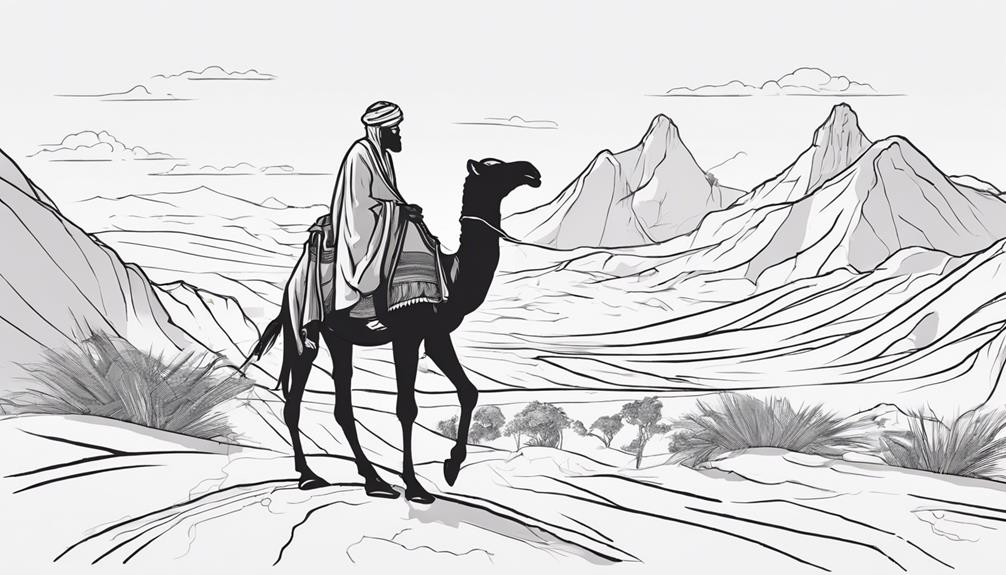
The exploration of Ibn Battuta across Africa and Asia stands as a testament to the extensive travels undertaken by individuals in the 14th century, shedding light on the diverse landscapes and cultures encountered during this remarkable journey.
- Ibn Battuta traveled over 75,000 miles across Africa and Asia, visiting over 40 modern-day countries.
- His travels lasted for almost 30 years, from 1325 to 1354, making him one of the most widely traveled individuals of his time.
- Ibn Battuta documented his journeys in the travelogue 'Rihla,' providing valuable insights into the social, cultural, and political landscape of the 14th century.
Through his encounters in prominent Islamic cities like Cairo, Mecca, and Delhi, Ibn Battuta not only interacted with rulers, scholars, and everyday people but also left behind a detailed account of his experiences. His accounts serve as a crucial historical source for understanding the diverse societies and customs of the medieval Islamic world. Ibn Battuta's travels exemplify a pioneering spirit of exploration that continues to inspire generations of adventurers and scholars alike.
Frequently Asked Questions
What Did the Great Explorers Discover?
Explorers uncovered ancient civilizations and new lands, revealing hidden treasures and indigenous cultures. Their expeditions unveiled geographic landmarks and unlocked access to valuable natural resources. Through their discoveries, these intrepid individuals expanded global knowledge and interconnected distant regions. Their findings reshaped societies and economies, influencing the course of history and fostering cultural exchanges that continue to resonate today.
Who Is the Greatest Explorer in History?
When evaluating the greatest explorer in history, the impact of Marco Polo's influence, Vasco da Gama's legacy, and Christopher Columbus' achievements must be carefully considered. Each explorer has left a lasting mark on history through their travels and discoveries, shaping global interactions and expanding knowledge of the world. By analyzing their contributions in the context of exploration, their significance in the annals of exploration can be better appreciated.
What Were the Greatest Discoveries of the Age of Exploration?
During the Age of Exploration, some of the greatest discoveries included the revelation of the New World, establishment of new trade routes, encounters with indigenous cultures, advancements in technology, expansion of geographical knowledge, and facilitation of cultural exchanges. These discoveries reshaped global understanding, impacted commerce, and set the stage for further exploration and colonization. The exploration era was pivotal in connecting distant lands and shaping the course of human history.
Which Explorer Had the Greatest Impact on the World?
When considering the explorer with the greatest impact on the world, Christopher Columbus is a prominent figure. Despite the Columbus controversy surrounding his treatment of indigenous populations, his voyages initiated an era of global exchange that forever altered cultures, economies, and societies. The legacy debate surrounding Columbus continues to spark discussion on the complexities of exploration and colonization, making him a pivotal figure in the history of exploration and its repercussions.
Conclusion
In conclusion, the greatest discoveries of explorers have left an indelible mark on history, shaping our understanding of the world and facilitating cultural exchanges. These journeys symbolize the human spirit of curiosity, ambition, and resilience in the face of the unknown. Through their expeditions, explorers have expanded our knowledge of geography, trade routes, and diverse cultures, laying the foundation for future exploration and scientific advancement. Their discoveries continue to inspire awe and wonder in generations to come.
